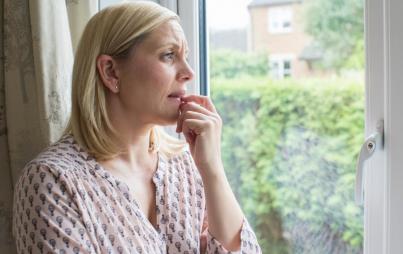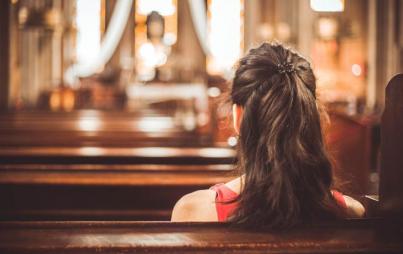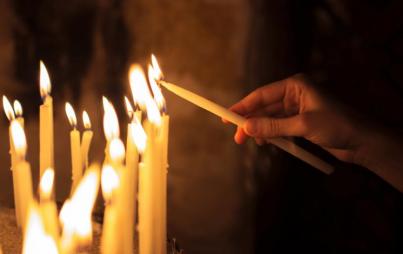
The nones are coming.
The thing about the 'nones' is that they are not actually an organized group — yet. They don’t all have the same background or beliefs or avoid traditional religion for the same reasons.
In spite of the coolest Pope ever being in the Vatican, a recent poll released by the Pew Research Center shows a decline in Americans who participate in religion. According to Pew, “The recent decrease in religious beliefs and behaviors is largely attributable to the nones — the growing minority of Americans, particularly in the millennial generation, who say they do not belong to any organized faith.” Pew found that nones “Now account for 23% of the adult population, up from 16% in 2007.”
If that sounds like a smallish percentage of American adults, you’re right — but bear in mind that it’s significant because it happened fast and isn’t slowing down; both Pew and news analysts seem to think the figures are endemic of a real cultural shift. This isn’t just an example of young kids sowing their wild oats.
Is America losing its religion?
Should we care?
As a millennial raised going back and forth between divorced parents and their respective Catholic and Evangelical Christian churches, I have had approximately 38,476 existential crises to date. So you may rightly guess that I found this news relevant — fascinating, even, with a dose of that good old cozy feeling of schadenfreude. (Without religion, HOW will the people experience the wonders of the Christian music industry!? I pity them. I pity them all.)
While the residual evangelical in me can’t help but expect fire and brimstone to rain down on our godless nation at any moment, I am cautiously optimistic. There’s something fascinating about seismic shifts and crossroads; they’re messy, but full of potential. I wonder: Are we as a culture throwing out the baby with the bathwater in losing our religion, or can we seize the day and use this cultural shift for good?
The answer seems to be: who knows? The thing about the 'nones' is that they are not actually an organized group — yet. They don’t all have the same background or beliefs or avoid traditional religion for the same reasons. They mostly don’t meet for weekly potlucks or have a clear-cut, religiously motivated political agenda like, say, evangelicals (remember Kim Davis refusing to issue same-sex marriage licenses?).
Nones are less like cultural warriors and more like a one-size-fits-all dress — no one knows what they’re supposed to look like. Part of the problem with defining yourself in negatives (i.e. not religious) is that it’s hard to pinpoint what you actually do stand for.
How will nones vote? As the fastest-growing religious affiliation in both political parties, the nones stand to play a pivotal role. Except they’re not voting as much as their religious counterparts. And while nones grow in numbers, the Pew poll also indicates that Americans who identify as religious are taking their faith more and more seriously.
Translation: A chasm is widening between the religious and the nones — and they have less and less in common.
I flash back and imagine my childhood church on one side of an ideological Grand Canyon, encouraging parishioners to vote for George W. Bush because he was pro-life, while my artsy New York friends sit on the other side of the chasm reading tarot cards and organizing Bernie Sanders rallies. The canyon is wide, my friends, and like Evil Knievel we might never quite make it across on our trusty motorcycles. NPR notes, “The Pew report suggests that polarization along religious lines may be increasing in the United States. While the percentage of Americans who say they don't affiliate with any religious tradition is growing, those people who still identify with a religion are becoming even more devout.”
Polarization increasing? Just picture bringing up same-sex marriage at your upcoming family Thanksgiving dinner, and you know: this is bad. This isn’t just me rolling my eyes at Fox News talk shows, it’s America gearing up to punch itself in the face.
It can be painful to lose your religion, especially for a country as weirdly obsessive about religion as the United States. Religion has been part of our social and political fabric since before we saw the redcoats coming. Part of me is excited that this may be a moment where our culture moves closer to the Founding Fathers’ original idea of separation of church and state, but deep down I’m afraid shedding meaningful identification with organized religion is a loss. I’m trying to have faith that, as more Americans create their own belief systems instead of following entrenched organizations, causes from religious freedom to social justice and human rights can flourish. But will they?
A girl can dream.
My fellow Americans, I am hopeful but concerned. As millennials rethink religion and traditional social organization, there is clearly room for vigorous, serious dialogue and change. I am hoping we will not define ourselves by negatives and nones, but by strong choices. This is a chance to restructure not only the way Americans search for God, but how we build community and establish social conventions with each other. It is a wake-up call for religious institutions to urgently address their failing attempts to reach and connect with the upcoming generations. But it is an equally important moment for those of us in the younger generations to start to think intentionally about what we plan to actually do with our burgeoning world views, then stand for something larger than ourselves and take responsibility for our role in our culture at large.
What if we define ourselves by what we are instead of what we are not?
We have an opportunity. As American culture changes, I suspect that everyone will have to work even harder to find common ground. We will need to think about how to get past the polarization to build communities that value human life equally. We’ll probably have to do a whole lot of listening and a little more soul-searching.
It’s all for one...or “none” for all.






